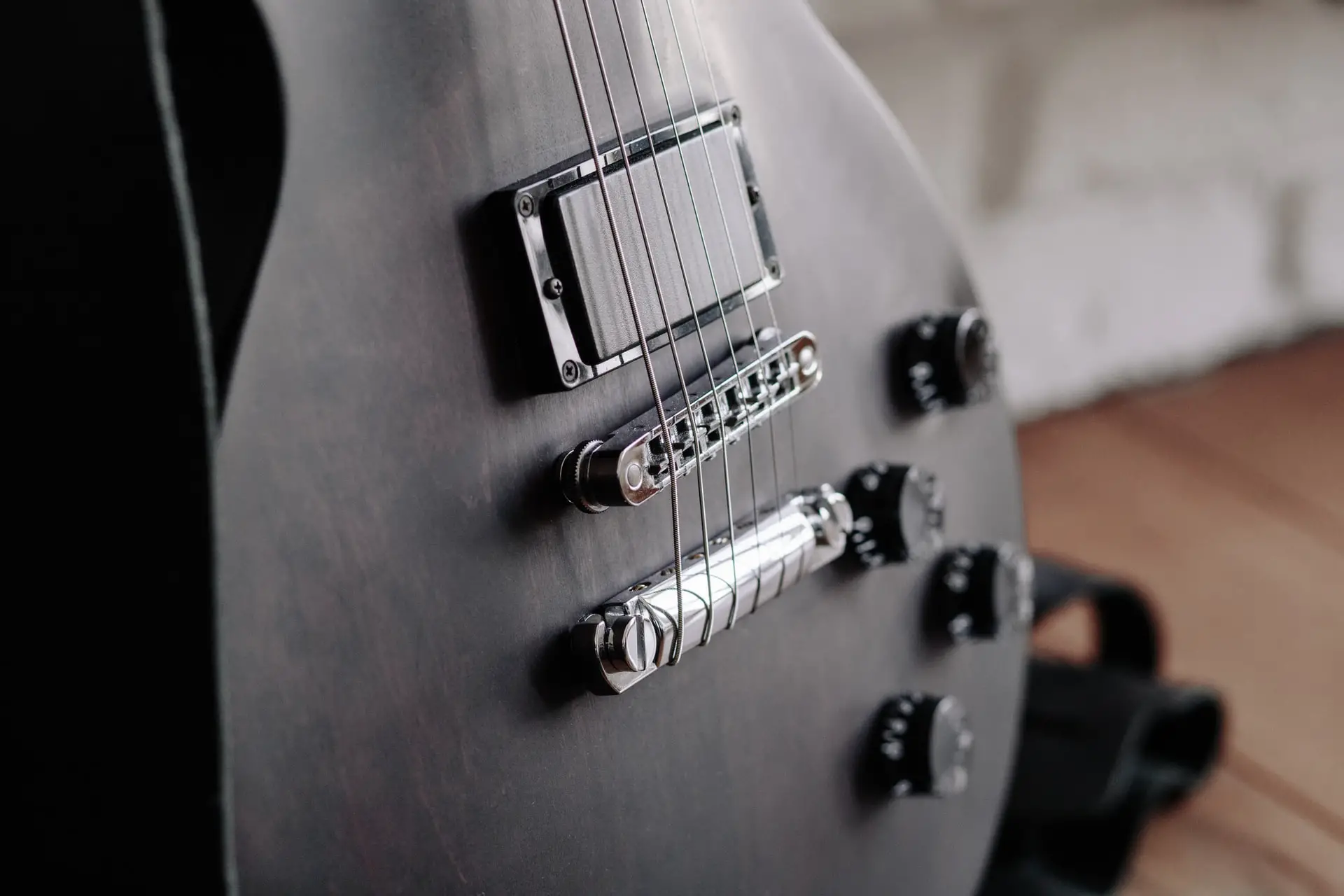Guitar pickup does matter and is important to produce guitar sound – different pickup types and setups could create different sounds.
However, the sound difference from cheap and expensive pickups is not significant. If you expect to create major distorted sound or other guitar effects, then upgrading your amp or pedal is a much better choice.
I notice this question is asked a lot in different forums and communities (especially for beginners).
As someone who has played with different types and setups of guitar pickups, I could chime in a little and give you my thoughts. Hopefully this clears things up for you.
In this article, I am going to cover:
- 6 pickup types & the sound difference
- Expensive pickup vs cheap pickup (4 differences)
- Are guitar pickups universal?
- Is upgrading the pickup from a cheap guitar worth it?
Actually, I am not hopeful. Rather, I am confident you will find your answers after finishing this article! So, shall we?
5 Pickup Types & Their Sound Difference
In this section, I highlight the different types of pickups and explain the sound they produce. You will see how different pickups help generate different sounds and they do matter – depending on the music you play.
1. Single Coil Pickup
Single coil pickups produce bright and clear tones. It’s suitable when playing with low gain and distortion.
Single coil pickup (like the name) uses a single coil wrapped around magnets and they appear as just 1 line or stripe on your guitar.
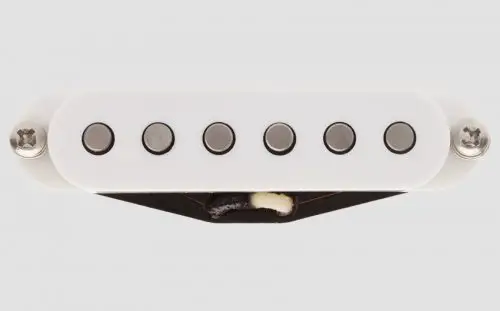
Single coil pickup – great for bright and clear sound.
If you need a loud and clear tone when playing riffs or leads, then single coil pickup is the best. Here’s how a single coil pickup sounds like:
2. Humbucker Pickup
Humbucker pickup produces warmer, quieter and thicker tones with higher bass. It’s suitable when playing with high gain and distortion.
Humbucker pickup uses two sets of coils – wrapped around magnets. They appear as 2 lines or stripes on your guitar body.
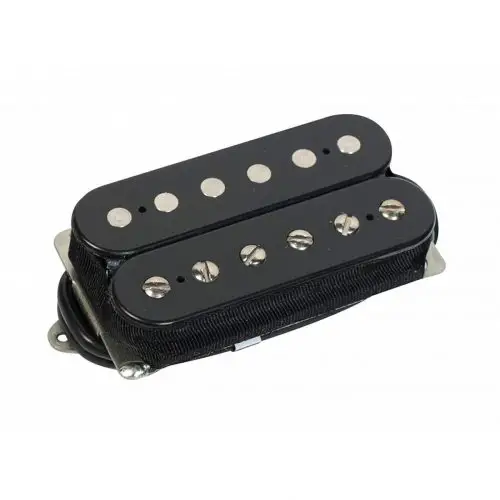
Humbucker pickup use 2 coils and they produce thicker and warmer sound – great for high distortion play.
The two coils on the humbucker pickup means there’s stronger sound signals going into your amp. This is great when playing with high gain and distortion. The effects you get are more powerful.
Here’s how the humbucker pickup sounds like:
3. Active Pickup
Active pickup produces much stronger sound signals going into your amp because they use battery power to help with the “pick up” – resulting in a more distinguished and consistent individual note.
With active pickup, you can clearly hear the sound made from every stroke of string. Suitable when playing metal riffs with high gain and distortion.
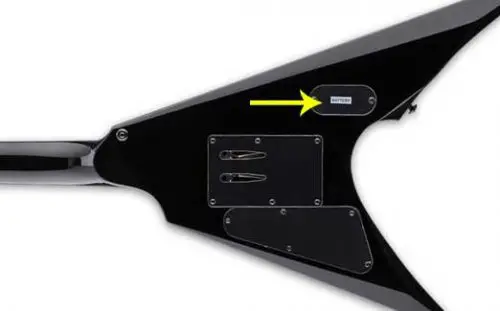
Active pickup needs battery that’s usually slotted at the back of the guitar.
Active pickups cannot be directly compared with humbucker or single coils. Active pickups only help to “pick up” more sound signals using an additional power source (the battery).
Both humbucker or single coil pickups can be an “active” pickup or the regular “passive” pickup.
I include active pickups and others below to show you why a pickup matters when it comes to producing sound. They are not direct comparisons with each other.
Here’s what an active humbucker pickup sounds like (when played with high gain). It’s much louder and every note is distinguishable.
(The active pickup guitar is white)
4. Passive Pickup
Passive pickup is your regular guitar pickup that works without additional power sources like the active pickups.
Passive pickups will provide weaker sound signals to your amplifier – so each tone is softer and you will need to rely on a good amp to amplify the sound signal. Especially if you play with high gain.
Passive pickups will sound poorly when played with high gains (if compared to active pickups).
Passive pickup is the most common pickup found on guitars. They are simply more convenient (not requiring additional battery)
5. Neck / Mid / Bridge Pickup
Neck pickup is the pickup that’s closest to your guitar neck (on the higher position). They produce softer and warmer, bassy sounds – suitable for rhythm rather than solos.
Neck pickup refers to the position of your pickup. You could have a neck single coil pickup or a neck humbucker pickup.
On the other hand, mid and bridge pickups are located away from the neck. More towards the end of your guitar body. The lower you go, the louder and sharper the sound would be.
Bridge pickup that’s at the very end will produce the loudest and cleanest sound. Most suitable during a guitar lead / solos.
From this, we know that even the positioning of a pickup matters in sound. So it’s an understatement to just say “pickup matters”. Even the position changes sound!
Fortunately, most guitars come with a pickup switch. You can switch to use mid, neck and bridge pickup any time.
Try switching the pickups on your guitar and notice the instant change.
Expensive Pickup Vs Cheap Pickup (4 Differences)
Expensive & cheap pickups do not change sound significantly. If you are still a beginner, you will likely not notice or appreciate it.
That said, here are the 4 differences between an expensive and cheap pickup:
- Sound production. Cheap pickups are less balanced. The bridge pickup is too sharp and bright – whereas the neck pickup sounds too warm and dark. Expensive pickups won’t have such drastic change between the neck and bridge.
- Better branding. Expensive pickups simply come from a more established brand with more marketing and endorsement budgets.
- Less quality control. Expensive pickups are usually hand crafted by an experienced professional – this increases overall quality and production. Whereas cheap pickups are mass produced with cheaper material and quality control.
- Manufacturing country. Expensive pickups are usually created locally, whereas cheap pickups are mass produced in foreign and cheaper countries like China / Mexico. Doesn’t mean they are bad – it’s just cheaper in foreign countries.
As you can see, expensive pickups and cheap pickups do not differ significantly. It’s all mostly manufacturing and marketing costs.
Expensive pickups do sound better than cheap pickups – but it’s not significant enough for most people. If you need a much improved sound, you are better off investing in a better amp or pedal.
Which Type Of Guitar Pickup Should You Get?
Humbucker, Single, Single (HSS) pickups are most versatile because you can easily switch and play other genres. Whereas Humbucker, Humbucker (HH) pickups are most suitable for high distortion and gain.
The best pickups depend entirely on your and your playing style. Different pickup types produce different sounds and have their own use cases.
For the majority of guitarists, I recommend going for a guitar with Humbucker, Single, Single (HSS) pickup – which means Humbucker as bridge pickup and 2 Single coil pickups as the mid and neck pickup.
You are most versatile with the HSS pickup configuration. When needing to play solo, switch to the neck single coil pickup. When needing to play high distortion, switch to the bridge humbucker pickup.
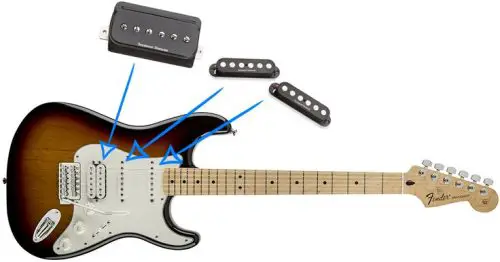
HSS Guitar Pickup configuration is most versatile.
If you specialize in high distortion play, then getting a Humbucker, Humbucker (HH) pickup configuration is great. You will sound better and louder on those dirty riffs.
You can also opt for an active HH pickup if you play lots of metal and need that clear distinction on each note.
Are Guitar Pickups Universal? (Any Pickup On Any Guitar)
Guitar pickups are universal. An aftermarket pickup can be installed on any guitar as long as the sizing and number of strings are matched.
Generally, you can replace pickups of the same type – a single coil for another single coil or a humbucker for another humbucker.
Most pickups use 6 strings. This really depends on your guitar. Just make sure the number of strings from the old pickup and new pickups are matched.
It’s also possible to switch a passive pickup into an active pickup setup (with batteries). But this is harder and you need to get the wiring right. I recommend you ask a professional about this – rather than attempting it yourself.
Is Upgrading The Pickup From Cheap Guitar Worth It?
Updating the pickup of a cheap guitar to improve the sound is not worth it. Pickup alone will not give you such a significant improvement to the sound. You should instead upgrade the amp or pedals.
Aside from the pickup, cheap guitars also lack in the strings, necks, body and finish. There are too many variables you need to change to significantly improve your cheap guitar.
If you are a beginner, upgrading a cheap guitar is pointless (especially the pickup). I doubt you will be able to distinguish the difference.
To make your guitar sound better, look into pedals that can provide you with the sound effects you need. This is almost always the right thing to do from my experience.
Related article: Do Cheap Guitars Sound Bad? (4 Ways To Make Them Better)
FAQs
Q: Which Pickup Is Used for Lead?
Generally, a bridge pick-up is used for playing lead. Bridge pick-up produces a sharp and brighter tone than a neck pick-up. That is why most of the lead guitar players use bridge pick-up for playing lead.
Bridge pick-up is well-known for producing a sharper and brighter tone. It is suitable for lead and tones with high gain.
I am a lead guitarist mainly from the heavy metal genre. My genre requires sharp and heavier tones with high gain. I use the bridge pick-up of my guitar for playing lead.
On the other hand, neck pick-up produces a mellow and warm sound. This tone is perfect for playing rhythms. However, some jazz players use neck pick-up for playing lead. There is no hard and fast rule about the pick-ups.
I recommend using a bridge pick-up for playing lead for two genres. These are heavy metal and rock. It will make your solo richer and darker.


